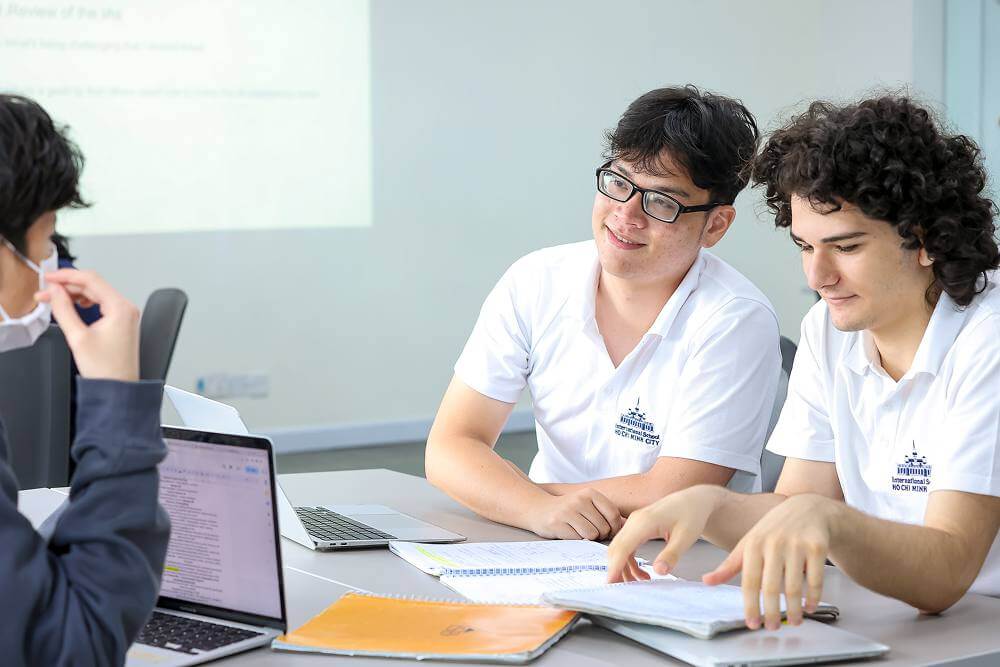IB vs IGCSE: What Are The Differences?
Choosing the right international education framework for your child—whether IB or IGCSE—can be overwhelming, especially with the abundance of terminology and varying approaches. At ISHCMC, we understand the importance of making informed decisions about your child’s academic journey. In this article, we explore the key differences between the International Baccalaureate (IB) and the International General Certificate of Secondary Education (IGCSE). By comparing their core philosophies, structures, and long-term benefits, we aim to provide clarity and insight to help you determine which pathway best supports your child’s future.
What is IB?
The International Baccalaureate (IB) is a globally recognized educational framework known for its rigorous, inquiry-based approach. It consists of three main programs:
- Primary Years Programme (PYP) (3-12 years old)
- Middle Years Programme (MYP) (11-16 years old)
- Diploma Programme (DP) (16-19 years old)
The IB curriculum helps students gain a cross-disciplinary education, allowing connections between academic subjects. It advocates for inquiry-based learning, which involves students’ independent research and group projects.
A key component of the IB Diploma Programme is the Core, which includes Theory of Knowledge (TOK), the Extended Essay (EE), and Creativity, Activity, Service (CAS). These components build students’ analytical competence, global outlook, and sense of responsibility.
Preparing students for higher education is one of the most important benefits of IB. Universities recognize the IB Diploma as a challenging qualification that fosters independent learning, problem-solving, and time management skills. IB students tend to do well at university, reflecting the excellent research skills and broad knowledge base that IB graduates possess.
ISHCMC structures the IB curriculum to give rise to an active, engaging learning environment, prompting the students to utilize critical thinking in reaching a globally aware attitude. With its extraordinary emphasis on inquiry learning and well-rounded development, ISHCMC empowers its students with suitable skills and knowledge necessary to excel at the upper-level stage of education as well as life after education stages.
What is IGCSE?
The International General Certificate of Secondary Education (IGCSE) is an internationally recognized qualification for students aged 14-16. Developed by Cambridge Assessment International Education, it is a content-rich, structured route to learning.

IGCSE prioritizes depth of understanding within separate subject domains. Students adhere to a more conventional learning paradigm that prioritizes test performance, subject mastery, and memorization. The curriculum offers a strong intellectual foundation and prepares students for advanced secondary school and specialized study routes.
Key Differences Between IB and IGCSE
Although the IB programme and the IGCSE are internationally recognised, they differ greatly in approach, structure, and fundamental educational philosophy.
Curriculum Level
The IB and IGCSE curricula differ in structure, focus, and subject organization, catering to different age groups and learning approaches. The table below outlines key distinctions between them:
| Factor | IB | IGCSE |
|---|---|---|
| Education Level | High school level (ages 16-19) | Middle to high school level (ages 14-16) |
| Programs | Multi-dimensional: Diploma Programme (DP), Middle Years Programme (MYP), Primary Years Programme (PYP) | Single-stage qualification (Cambridge or Pearson) |
| Focus & Philosophy | Holistic, inquiry-based learning that emphasizes critical thinking and global perspectives | Content-driven, exam-focused approach centered on subject-specific knowledge |
| Subject Groups | 6 structured groups (Languages, Humanities, Sciences, Math, Arts, Electives) | Wide range of subjects, less structured, including language and literature, humanitiies and social sciences, mathematics, and other science subjects |
| Compulsory Subjects | Language, Math, Science, Humanities, TOK, EE, CAS | Flexible, based on student interest |
Teaching & Learning Style
Both IB and IGCSE emphasize academic excellence but differ in their teaching methodologies, learning environments, and skill development. The table below highlights these differences:
| Factor | IB | IGCSE |
|---|---|---|
| Learning approach | Students learn actively, study and gain knowledge from critical thinking | Designed for the gaining of accurate knowledge and practice exams |
| Teaching style | Teachers guide students to discover and connect knowledge independently | Teachers motive classroom with sufficient module coverage |
| Classroom environment | Discussive, collaborative, debate and group work based | Flexible learning environments, including traditional and online settings |
| Student role | Encourages independent thought, contemplation and entrepreneurship | Flexible to teaching style and learning goal |
| Skills emphasis | Promotes critical thought, independent research, time sensitivity, and global awareness | Develop critical thinking, problem-solving, and independent learning skills |
| Assessment methods | Equal weighting of process (internal assessment) and product (external exams) | Include a mix of written exams, coursework, practical assessments, and oral assessments |
| Use of technology and tools | Often uses online tools, presentations, research sites, and creativity | Differing by school, but usually more traditional and test-based in tools used |
Global Recognition
IB and IGCSE are internationally recognized qualifications, but they serve different academic pathways and university preparation purposes. The table below compares their global recognition and academic value:
| Factor | IB | IGCSE |
|---|---|---|
| Recognition | Accepted by virtually all universities globally (US, UK, EU, Canada, Australia) | Recognized as equivalent to UK secondary qualifications |
| Purpose | Prepares for university through extensive research, critical thinking, and worldwide consciousness | Prepares for future learning opportunities like A-levels or the IB diploma; prepares foundation for elaboration on ideas and skills in exams |
| University credit | Normally granted advanced placement or credit on joining most North American universities. | No credit toward a university, but used as a stepping stone to upper secondary programs |
| Global reach | Offered in over 160 countries | Available in 150 countries |
| Academic value | Considered demanding and balanced; aids university applications and scholarships | Considered a good academic foundation, but commonly part of a longer journey to university |
Which Curriculum is Better
Deciding between IB vs IGCSE depends on a lot of factors, including your child’s learning styles, future aspirations, and the school’s academics
1. Learning Style: The IB program would suit students who are competent at independent learning and excel at inter-disciplinary learning and critical thinking. On the other hand, the IGCSE suits students who learn better with subject-wise exam formats.
2. Future Academic Goals: The IB provides knowledge and skills that are essential for success in research-based future university programs, particularly those requiring analytical and problem-solving skills. In contrast, IGCSE provides a strong academic foundation and allows students to transition smoothly into A-Levels or pre-university programs before narrowing down their subjects.

3. School Infrastructure: The quality of IB or IGCSE education depends on how effectively a specific school implements the curriculum. For students, parents should make an informed choice by considering things like teacher experience, classroom supplies, extracurricular activities, and available assistance.
At ISHCMC, we provide the IB program, which gives students the core skills and knowledge to succeed in university and beyond. Find out more about the IB program at ISHCMC here.
Explore ISHCMC’s IB Programs
Both IB and IGCSE have advantages and fit multiple learning styles and academic aspirations. While the IGCSE provides a strong base with a subject-oriented focus, the IB yields balanced, analytical thinkers who are ready for university and life ahead. Parents select a curriculum based on their child’s learning style and future aspirations.
ISHCMC is proud to offer the IB program, which supports inquiry-based learning and develops global-mindedness. Find out how our International Baccalaureate program can change your child’s future. Apply to ISHCMC today!






